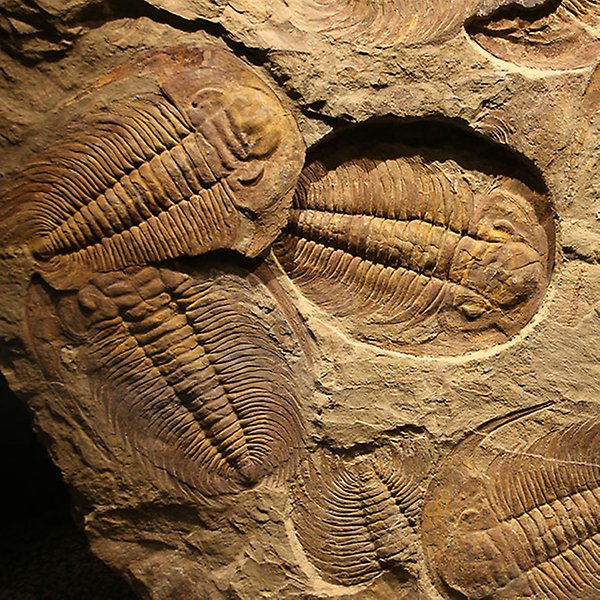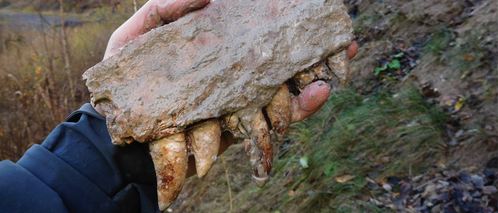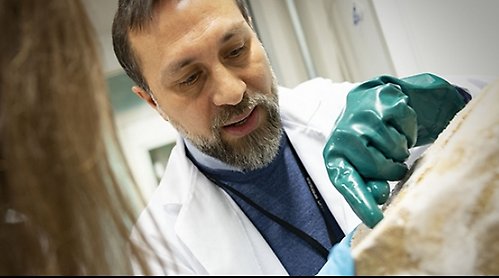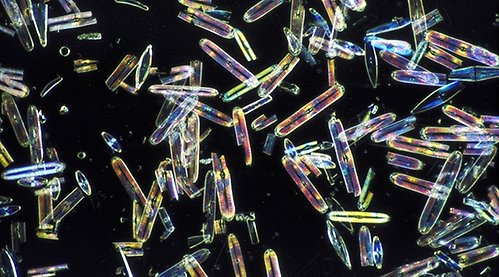The development of life
Approximately 580 million years ago, something happened that would change the Earth forever. Complex life arose and the first animals saw the light of day. What were these creatures? And how did they live? How did animals emerge onto dry land and when did human beings really become human? How has life developed since then and what will the future bring?
The development of life is about the evolution of living organisms from the first protocell to the current diversity of biological life, and how everything is connected and works. The research ranges from studies of the most ancient fossils discovered and the evolution of species to the current challenges of preserving biodiversity. Advanced modern technology, machine learning, artificial intelligence and interdisciplinary approaches offer the prospect of new answers to complex questions.

Examples of ongoing research
Large predatory dinosaurs discovered in Skåne
Roughly 200-million-year-old footprints of large predatory dinosaurs, along with the skeletons of ot...

Paco Cardenas: Looking for the future of pharmacy among the planet's first animals
For thousands of years, man has explored the earth to find new tools for health care. When climate c...

Why did ocean productivity decline 4.6 million years ago?
By drilling deep down into sediments on the ocean floor researchers can travel back in time. A resea...

Centres, platforms and research
Uppsala Centre for Evolution and Genomics – UCEG
The Uppsala Centre for Evolution and Genomics, or UCEG, consists of a group of researchers who work together to better understand how living organisms change through evolution.
Uppsala Centre for Evolution and Genomics – UCEG
Evolution and development
Which historical factors and genetic mechanisms are behind the diversity among vertebrates? In evolution and development, researchers study how the body shape, internal structure and function of different vertebrates have been altered by evolution. They use information from fossils and living animals and investigate the underlying developmental biology and genetic processes that give rise to the diversity we see in vertebrates today.
Evolution and development at the Department of Organismal Biology
Comparative Physiology
In Comparative Physiology, researchers examine how different animals have adapted to different lifestyles and habitats. Using physiological, biochemical and molecular studies, researchers study entire organisms at tissue, cellular and molecular level.
Comparative Physiology at the Department of Organismal Biology
Ecology and Genetics
Which mechanisms and processes have governed and continue to govern how groups of individuals (populations) slowly change from generation to generation. In ecology and genetics, these processes are studied at all levels from DNA molecules via individuals and populations to species and entire communities of different species.
Research at the Department of Ecology and Genetics
Human evolution
In the field of human evolution, researchers seek to find knowledge about man’s hidden past. It is about how modern humans have developed; their history and genetics. Today, modern genetic methods are used to analyse very old material from ancient people and compare it with material from today’s humans, thus finding out how humans managed to spread across the world and how human genetics have changed.
Research at the Department of Organismal Biology
The human genome
A large international consortium led by scientists at Uppsala University and the Broad Institute of MIT and Harvard has sequenced the genome of 130 mammals and analysed the data together with 110 existing genomes to allow scientist to identify which are the important positions in the DNA. This new information can help both research on disease mutations in humans and how best to preserve endangered species.
News: 240 mammals help us understand the human genome
Palaeobiology
Palaeobiology combines research in earth sciences with the biological sciences. Examinations of fossilised lifeforms give us the opportunity to recreate and understand the evolutionary changes that have occurred throughout Earth’s history.
Palaeobiology at the Department of Earth Sciences
Uppsala University Behavioral Facility
The Uppsala University Behavioural Facility (UUBF) offers support, tools and adapted testing environments to researchers who use mice, rats and selected fish species in preclinical behavioural studies. All staff at the organisation have long experience in the area and can assist with planning, implementation, analysis and interpretation of results.
